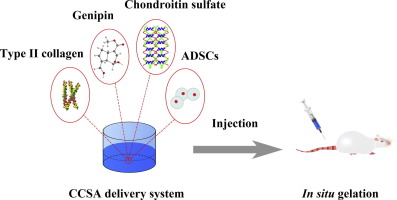Acta Biomaterialia ( IF 9.4 ) Pub Date : 2018-03-16 , DOI: 10.1016/j.actbio.2018.03.019
Xiaopeng Zhou , Jingkai Wang , Weijing Fang , Yiqing Tao , Tengfei Zhao , Kaishun Xia , Chengzhen Liang , Jianming Hua , Fangcai Li , Qixin Chen

|
Nucleus pulposus (NP) degeneration is usually the origin of intervertebral disc degeneration and consequent lower back pain. Although adipose-derived stem cell (ADSC)-based therapy is regarded to be promising for the treatment of degenerated NP, there is a lack of viable cell carriers to transplant ADSCs into the NP while maintaining cell function. In this study, we developed a type II collagen/chondroitin sulfate (CS) composite hydrogel-like ADSC (CCSA) delivery system with genipin as the cross-linking agent. The induction effect of the scaffold on ADSC differentiation was studied in vitro, and a rat coccygeal vertebrae degeneration model was used to investigate the regenerative effect of the CCSA system on the degenerated NP in vivo. The results showed that the CCSA delivery system cross-linked with 0.02% genipin was biocompatible and promoted the expressions of NP-specific genes. After the injection of the CCSA system, the disc height, water content, extracellular matrix synthesis, and structure of the degenerated NP were partly restored. Our CCSA delivery system uses minimally invasive approaches to promote the regeneration of degenerated NP and provides an exciting new avenue for the treatment of degenerative disc disease.
Statement of significance
Nucleus pulposus (NP) degeneration is usually the origin of intervertebral disc degeneration and consequent low back pain. Stem cell-based tissue engineering is a promising method in NP regeneration, but there is a lack of viable cell carriers to transplant ADSCs into the NP while maintaining cell function. In this study, we developed a type II collagen/chondroitin sulfate (CS) composite hydrogel-like ADSCs (CCSA) delivery system with genipin cross-linking. Although several research groups have studied the fabrication of injectable hydrogel with biological matrix, our study differs other works. We chose type II collagen and CS, the two primary native components in the NP, as the main materials and combined them according to the natural ratio of collagen and sGAG in the NP. The delivery system is pre-loaded with ADSCs and can be injected into the NP with needle, followed by in situ gelation. Genipin is used as a cross-linker to improve the bio-stability of scaffold, with low cytotoxicity. We investigated the stimulatory effects of our scaffold on ADSCs differentiation in vitro and the regenerative effect of the CCSA delivery system on degenerated NP in vivo.
中文翻译:

Genipin交联的II型胶原/硫酸软骨素复合水凝胶样细胞传递系统诱导脂肪干细胞分化并再生退化的髓核
髓核(NP)变性通常是椎间盘变性和因此而引起的下腰痛的起源。尽管基于脂肪干细胞(ADSC)的疗法被认为是治疗退化性NP的有希望的方法,但仍缺乏将ADSC移植到NP并同时维持细胞功能的活细胞载体。在这项研究中,我们开发了一种以Genipin为交联剂的II型胶原/硫酸软骨素(CS)复合水凝胶样ADSC(CCSA)递送系统。体外研究了支架对ADSC分化的诱导作用,并用大鼠尾骨变性模型研究了CCSA系统对体内变性NP的再生作用。。结果表明,与0.02%genipin交联的CCSA递送系统具有生物相容性,并促进了NP特异性基因的表达。注射CCSA系统后,椎间盘高度,水含量,细胞外基质合成和变性NP的结构得以部分恢复。我们的CCSA输送系统使用微创方法来促进变性NP的再生,并为治疗变性椎间盘疾病提供了令人兴奋的新途径。
重要声明
髓核(NP)变性通常是椎间盘变性和随之而来的下腰痛的起源。基于干细胞的组织工程学是NP再生中一种有前途的方法,但是缺乏将ADSCs移植到NP中同时维持细胞功能的活细胞载体。在这项研究中,我们开发了具有Genipin交联功能的II型胶原蛋白/硫酸软骨素(CS)复合水凝胶样ADSC(CCSA)递送系统。尽管几个研究小组已经研究了具有生物基质的可注射水凝胶的制备,但我们的研究与其他工作有所不同。我们选择II型胶原蛋白和CS(NP中的两个主要天然成分)作为主要材料,并根据NP中胶原蛋白和sGAG的天然比例进行组合。原位凝胶化。Genipin用作交联剂,以提高支架的生物稳定性,并具有较低的细胞毒性。我们研究了我们的支架对ADSCs体外分化的刺激作用和CCSA递送系统对体内退化NP的再生作用。

































 京公网安备 11010802027423号
京公网安备 11010802027423号